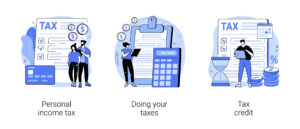Rising prices make inflation-protected securities more attractive

Rising prices make inflation-protected securities more attractive
High oil and gasoline prices combined with trouble in the Middle East, saber-rattling by North Korea, and a slowing housing market have many investors worried anew about inflation. Inflation is an ugly creature; when it spins out of control, it can quickly erase gains built up over years of careful saving and investing. One way to keep inflation in check and guard your portfolio is to invest in inflation-protected notes and bonds.
Comment.
Consumer prices rose again in June 2006 for the sixth consecutive month. Core prices, excluding food and energy, rose 0.30 percent. Overall, inflation is running at about 4.7 percent since the start of 2006 compared to 3.4 percent in 2005.
Many countries issue inflation-protected notes and bonds. At home, you can purchase Treasury Inflation Protected Securities (called “TIPS” for short) and I Bonds. If you’re an international investor, France issues inflation-protected bonds denominated in euros. The United Kingdom has long been a leader in inflation-protected investments, having issued its first inflation-protected bonds more than 20 years ago.
TIPS
TIPS work just like traditional Treasury notes and bonds. You lend the government money and the government promises to repay you plus interest. Unlike traditional Treasury bonds and notes, TIPS have an extra feature: inflation protection. The government indexes your principal based on the consumer price index (CPI). When inflation rises, your principal increases. If the opposite occurs and prices fall, TIPS are adjusted for deflation.
Let’s look at an example. You invest $10,000 in a 10-year TIPS note. The rate of interest is 2.5 percent. You will earn 2.5 percent interest over the life of the bond. If you had purchased a traditional Treasury note, you would have earned a higher interest rate but without inflation protection.
TIPS pay interest semi-annually at a fixed rate. The rate is determined at auction. Interest payments will vary, however, because the rate is applied to the adjusted principal. When TIPS mature, the government will pay you either the adjusted principal or the original principal, whichever is greater.
The Treasury Department sells TIPS in increments of $1,000, which is the minimum purchase amount. TIPS are issued in terms of five, 10 and 20 years. If you don’t want to hold the note until it matures, you can sell it on a secondary market.
I Bonds
I Bonds are another inflation-protected investment. Unlike TIPS, they do not require a minimum $1,000 investment. You can purchase an I bond with as little as $50 for a paper bond and $25 for an electronic bond.
I Bonds grow in value with inflation-indexed earnings for 30 years. However, you can redeem them anytime after one year. However, if you redeem them within the first five years, you will forfeit the three most recent months’ interest.
Tax considerations
While TIPS and I bonds protect you from inflation, they can’t keep Uncle Sam at bay when it comes to taxes. You will owe federal income tax on all interest earnings and inflation adjustments. The good news is that you will not pay state or local income tax on TIPS and I Bonds.
Although federal taxes cannot be avoided they can be postponed. You can purchase TIPS for your traditional IRA. Because you purchased them for a tax-deferred account, you will not pay federal income tax on your earnings and the adjustments until you start receiving distributions. Give our office a call to explore this option in more detail.
You also may be able to exclude some or all of the interest from I Bonds if you use them to pay for higher education expenses. Not all expenses qualify but many do. Again, our office can help you determine which educational expenses qualify and if you should take advantage of this tax break.
We hope you found this article about “Rising prices make inflation-protected securities more attractive” helpful. If you have questions or need expert tax or family office advice that’s refreshingly objective (we never sell investments), please contact us or visit our Family office page or our website at www.GROCO.com. Unfortunately, we no longer give advice to other tax professionals gratis.
To receive our free newsletter, contact us here.
Subscribe our YouTube Channel for more updates.

Alan Olsen, is the Host of the American Dreams Show and the Managing Partner of GROCO.com. GROCO is a premier family office and tax advisory firm located in the San Francisco Bay area serving clients all over the world.
Alan L. Olsen, CPA, Wikipedia Bio

GROCO.com is a proud sponsor of The American Dreams Show.

The American Dreams show was the brainchild of Alan Olsen, CPA, MBA. It was originally created to fill a specific need; often inexperienced entrepreneurs lacked basic information about raising capital and how to successfully start a business.
Alan sincerely wanted to respond to the many requests from aspiring entrepreneurs asking for the information and introductions they needed. But he had to find a way to help in which his venture capital clients and friends would not mind.
The American Dreams show became the solution, first as a radio show and now with YouTube videos as well. Always respectful of interview guest’s time, he’s able to give access to individuals information and inspiration previously inaccessible to the first-time entrepreneurs who need it most.
They can listen to venture capitalists and successful business people explain first-hand, how they got to where they are, how to start a company, how to overcome challenges, how they see the future evolving, opportunities, work-life balance and so much more..
American Dreams discusses many topics from some of the world’s most successful individuals about their secrets to life’s success. Topics from guest have included:
Creating purpose in life / Building a foundation for their life / Solving problems / Finding fulfillment through philanthropy and service / Becoming self-reliant / Enhancing effective leadership / Balancing family and work…

MyPaths.com (Also sponsored by GROCO) provides free access to content and world-class entrepreneurs, influencers and thought leaders’ personal success stories. To help you find your path in life to true, sustainable success & happiness. It’s mission statement:
In an increasingly complex and difficult world, we hope to help you find your personal path in life and build a strong foundation by learning how others found success and happiness. True and sustainable success and happiness are different for each one of us but possible, often despite significant challenges.
Our mission at MyPaths.com is to provide resources and firsthand accounts of how others found their paths in life, so you can do the same.
5 Steps to Great Time Management
5 Steps to Great Time Management By Yihan Lin: Before you learn how to manage the resources of an organization, you must first be learning time management skills for your own life.Time management skills are founded on this principle: If you don’t manage your own life, no one else will. Therefore it is essential that…
IRS Notice 2009-62 Issued 8/7/09
IRS Notice 2009-62 Issued 8/7/09 The due date for reporting the existence of Offshore Bank Accounts on Treasury Department Form TD F 90-22.1 has been an issue of great confusion in the last few months. Form TD F 90-22.1 is known as Foreign Bank Account Reporting (AKA “FBAR”) For a complete review of this soap…
Income the IRS Can’t Touch
Income the IRS Can’t Touch There’s one readily available and legal source of untaxed income that we know of: municipal bonds. These securities are issued by state and local governments, school districts, hospitals and other public agencies to support community projects and services. To permit these worthy endeavors to raise money economically, Uncle Sam exempts…
Avoiding Real Estate Tax Revaluations
Avoiding Real Estate Tax Revaluations by Steven Singer, CPA As a result of the passage of Proposition 13 almost thirty years ago, real estate owners currently enjoy paying property taxes based on the property’s purchase price, value of improvements and an annual increase of 2% over the previous years’ assessed value. As a result of…


